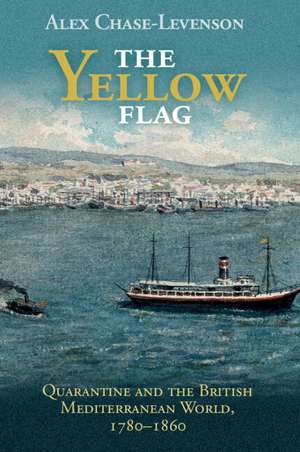The Yellow Flag: Quarantine and the British Mediterranean World, 1780–1860: Global Health Histories
Autor Alex Chase-Levensonen Limba Engleză Paperback – 26 oct 2022
| Toate formatele și edițiile | Preț | Express |
|---|---|---|
| Paperback (1) | 225.20 lei 6-8 săpt. | |
| Cambridge University Press – 26 oct 2022 | 225.20 lei 6-8 săpt. | |
| Hardback (1) | 631.51 lei 3-5 săpt. | |
| Cambridge University Press – 15 apr 2020 | 631.51 lei 3-5 săpt. |
Preț: 225.20 lei
Nou
Puncte Express: 338
Preț estimativ în valută:
43.09€ • 46.08$ • 35.93£
43.09€ • 46.08$ • 35.93£
Carte tipărită la comandă
Livrare economică 17 aprilie-01 mai
Preluare comenzi: 021 569.72.76
Specificații
ISBN-13: 9781108707282
ISBN-10: 1108707289
Pagini: 319
Dimensiuni: 152 x 229 x 17 mm
Greutate: 0.43 kg
Editura: Cambridge University Press
Colecția Cambridge University Press
Seria Global Health Histories
Locul publicării:Cambridge, United Kingdom
ISBN-10: 1108707289
Pagini: 319
Dimensiuni: 152 x 229 x 17 mm
Greutate: 0.43 kg
Editura: Cambridge University Press
Colecția Cambridge University Press
Seria Global Health Histories
Locul publicării:Cambridge, United Kingdom
Cuprins
Introduction; Part I. Mediterranean Currents: 1. Universal agitation; 2. Locating the British Mediterranean world; Part II. Lazarettos, Health Boards, and the Building of a Biopolity: 3. Governing quarantine; 4. 'A sort of hospital-prison'; 5. A European system; Part III. Imagining the Plague: 6. Plague and 'civilization'; 7. A prescription for England's condition; Part IV. Old Patterns, New Cordons: 8. Quarantine and empire; 9. Mutually assured deconstruction; Conclusion: Plagueomania; Bibliography; Index.
Recenzii
'A refreshingly original look at a phenomenon historians have chronically misunderstood. Imaginative and vivid, The Yellow Flag uses exhaustive archival research to breathe life into centuries-old policies and debates. The book is about more than just quarantine; it delves deeply into one of the great questions of the nineteenth century - and indeed of our own age: what are the responsibilities of the modern state?' David Barnes, University of Pennsylvania
'A new history of the Mediterranean, a new history of early nineteenth-century Britain, and a new history of quarantine. Chase-Levenson has delivered all three in this spectacular study. In those strange and charged places, Mediterranean lazarettos, he shows us how 'east' and 'west' were demarcated. A major contribution.' Alison Bashford, University of New South Wales
'Chase-Levenson's rich transnational history of Mediterranean quarantine powerfully illuminates the early 19th century significance of plague and other epidemics for the construction of a 'European biopolity', the consolidation of quarantine as a system reciprocally binding Britain and its European Mediterranean trading partners, and the oft-times parochial history of English public health.' James Hanley, University of Winnipeg
'… the book provides the most comprehensive approach to the history of quarantine and proves to be an enjoyable and important reading to anyone interested in the history of epidemics, preventative medicine and the history of the Mediterranean.' Marina Inì, Social History of Medicine
'The Yellow Flag: Quarantine and the British Mediterranean World, 1780–1860 is a timely book … numerous scholars and students will find Chase-Levenson's work interesting and useful from political, medical, and maritime perspectives.' Sarah E. Naramore, Book Reviews (www.globalmaritimehistory.com)
'In this imaginative work, Chase-Levenson (Univ. of Pennsylvania) skillfully argues that quarantine was not some antiquated system but rather a modern tool Britain employed to protect its subjects and trade networks … will interest scholars of Britain and Europe and those interested in empire, maritime history, global trade, globalization, and the history of health and medicine.' J. Rankin, Choice
'The Yellow Flag will reward readers interested in the history of health, diplomacy, and travel in the Mediterranean and beyond.' Kathleen Frederickson, Victorian Studies
'A new history of the Mediterranean, a new history of early nineteenth-century Britain, and a new history of quarantine. Chase-Levenson has delivered all three in this spectacular study. In those strange and charged places, Mediterranean lazarettos, he shows us how 'east' and 'west' were demarcated. A major contribution.' Alison Bashford, University of New South Wales
'Chase-Levenson's rich transnational history of Mediterranean quarantine powerfully illuminates the early 19th century significance of plague and other epidemics for the construction of a 'European biopolity', the consolidation of quarantine as a system reciprocally binding Britain and its European Mediterranean trading partners, and the oft-times parochial history of English public health.' James Hanley, University of Winnipeg
'… the book provides the most comprehensive approach to the history of quarantine and proves to be an enjoyable and important reading to anyone interested in the history of epidemics, preventative medicine and the history of the Mediterranean.' Marina Inì, Social History of Medicine
'The Yellow Flag: Quarantine and the British Mediterranean World, 1780–1860 is a timely book … numerous scholars and students will find Chase-Levenson's work interesting and useful from political, medical, and maritime perspectives.' Sarah E. Naramore, Book Reviews (www.globalmaritimehistory.com)
'In this imaginative work, Chase-Levenson (Univ. of Pennsylvania) skillfully argues that quarantine was not some antiquated system but rather a modern tool Britain employed to protect its subjects and trade networks … will interest scholars of Britain and Europe and those interested in empire, maritime history, global trade, globalization, and the history of health and medicine.' J. Rankin, Choice
'The Yellow Flag will reward readers interested in the history of health, diplomacy, and travel in the Mediterranean and beyond.' Kathleen Frederickson, Victorian Studies
Notă biografică
Descriere
Examines British engagement with the Mediterranean quarantine system to show how fear of disease drew Britain into a Continental biopolity.















